Union (United States)
Appearance
(Redirected from Union (American Civil War))
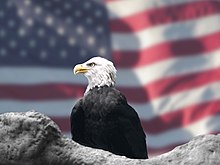
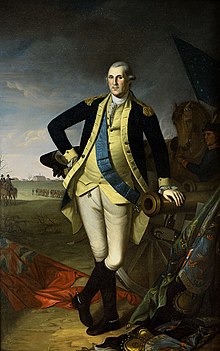
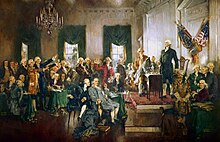


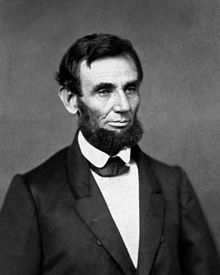


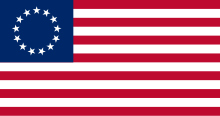







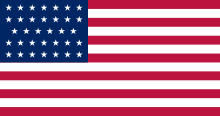

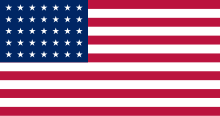


The Union is a term that has historically been used to refer to the United States of America, particularly during the American Civil War and specifically to the national government and the 20 other free states and five border slave states which supported it. During the American Civil War, the Union was opposed by 11 southern slave-owning states that had declared a secession to join together to form the Confederacy. The U.S. was opposed to the Confederacy, never recognizing the claimed legitimacy of the Confederacy's declaring of secession. It insisted at all times that it remained entirely a part of the United States of America. After four years of open warfare, the Union defeated the Confederacy, ending slavery in the country.
Quotes
[edit]A
[edit]- Our union is now complete; our constitution composed, established, and approved. You are now the guardians of your own liberties. We may justly address you, as the decemviri did the Romans, and say, 'Nothing that we propose can pass into a law without your consent. Be yourselves, O Americans, the authors of those laws on which your happiness depends.'
- Samuel Adams, speech about the Declaration of Independence (1 August 1776)
- Liberty! Equality! Fraternity!
- Anonymous Unionist, as quoted in Richmond Daily Dispatch (13 November 1863)
- No Distinction of Race! No Distinction of Color!
- Anonymous Unionist, as quoted in Richmond Daily Dispatch (13 November 1863)
B
[edit]- It's a Story they tell in the border country, where Massachusetts joins Vermont and New Hampshire. Yes, Dan'l Webster's dead—or, at least, they buried him.
But every time there's a thunderstorm around Marshfield, they say you can hear his rolling voice in the hollows of the sky. And they say that if you go to his grave and speak loud and clear, "Dan'l Webster—Dan'l Webster!" the ground'll begin to shiver and the trees begin to shake. And after a while you'll hear a deep voice saying, "Neighbor, how stands the Union?" Then you better answer the Union stands as she stood, rock-bottomed and copper-sheathed, one and indivisible, or he's liable to rear right out of the ground. At least, that's what I was told when I was a youngster.- Stephen Vincent Benét, The Devil and Daniel Webster (1937), pp. 13–14
C
[edit]- [A]n indissoluble relation. All the obligations of perpetual union, and all the guaranties of republican government in the Union, attached at once to the state. The Act which consummated her admission into the Union was something more than a compact; it was the incorporation of a new member into the political body. And it was final.
- Mister Toombs was willing to dissolve the Union to save slavery, Mister Phillips, to save liberty; while Mister Seward, denounced and derided by both, declared that the deepest instinct of the American people was for union. Reserved rights. State rights, limited powers, the advantages of union and disunion, were the cucumbers from which we were busily engaged in distilling light, overlooking the fact of nationality in discussing the conditions of union. We were speculating upon costume. We gravely proved that the clothes were the clothes of a woman, or of a child, without seeing that whatever the clothes might be there was a full-grown man inside of them. "The Constitution is a contract between sovereign States", shouted Mister Toombs, "let Georgia tear it and separate". "The Constitution is a league with hell", calmly replied Mister Phillips, "let New York cut off New Orleans to rot alone". "Oh, dear! it's a dreadful dilemma", whimpered President Buchanan. "States have no right to secede, and the United States have no right to coerce. Oh, dear me! it's perfectly awful! I'm the most patriotic of men, but what shall I do? what shall I do?" Separate! Cut off! Secede! It was of a living body they spoke, which, pierced anywhere, quivered everywhere.
D
[edit]- [A]lways there had been the complicated factor of the one institution that peculiarly set the South apart from the North, slavery... Southern states had embraced the Union only insofar as it served to protect their rights to hold property in slaves, and to spread slavery as the nation expanded and the institution itself became intertwined as a defining element in the struggle for national power itself. In slavery could not spread as new states were formed, then the existing slave states would be doomed to perpetual minority in representation in Congress, guaranteeing that if the day came when Northern antipathy to slavery itself became hot enough, the majority could use the government to subvert the Constitution and abolish the institution where it already existed. In short, the South could not affort to lose any battle over slavery, nor even over issues on its periphery.
- William Davis, Look Away!: A History of the Confederate States of America (2002), New York: The Free Press, p. 3
- Our cause is just, our union is perfect.
- There are only two sides to this question. Every man must be for the United States or against it. There can be no neutrals in this war; only patriots and traitors.
- Stephen Douglas, last public speech before his death, Chicago, Illinois (1 May 1861).
- My argument against the dissolution of the American Union is this. It would place the slave system more exclusively under the control of the slave-holding states, and withdraw it from the power in the northern states which is opposed to slavery. Slavery is essentially barbarous in its character. It, above all things else, dreads the presence of an advanced civilization. It flourishes best where it meets no reproving frowns, and hears no condemning voices. While in the Union it will meet with both. Its hope of life, in the last resort, is to get out of the Union. I am, therefore, for drawing the bond of the Union more completely under the power of the free states. What they most dread, that I most desire. I have much confidence in the instincts of the slaveholders. They see that the Constitution will afford slavery no protection when it shall cease to be administered by slaveholders. They see, moreover, that if there is once a will in the people of America to abolish slavery, this is no word, no syllable in the Constitution to forbid that result. They see that the Constitution has not saved slavery in Rhode Island, in Connecticut, in New York, or Pennsylvania; that the Free States have only added three to their original number. There were twelve Slave States at the beginning of the Government: there are fifteen now.
- Frederick Douglass, "The Constitution of the United States: Is It Pro-Slavery or Anti-Slavery?" (26 March 1860), Glasgow, United Kingdom.
F
[edit]- Rally round the flag, boys—
Give it to the breeze!
That's the banner that we bore
On the land and seas.
Brave hearts are under it,
Let the traitors brag,
Gallant lads, fire away!
And fight for the flag.
Their flag is but a rag—
Ours is the true one;
Up with the Stars and Stripes!
with the new one!
Let our colors fly, boys—
Guard them day and night;
For victory is liberty,
And God will bless the right.- James Thomas Fields, "The Stars and Stripes"; reported in Florence Adams and Elizabeth McCarrick, Highdays & Holidays (1927), pp. 182–83.
- Every Body cries, a Union is absolutely necessary, but when they come to the Manner and Form of the Union, their weak Noddles are perfectly distracted.
- Benjamin Franklin, letter to Peter Collinson (29 December 1754); published in The Writings of Benjamin Franklin (1905), edited by Albert Henry Smyth, Vol. III, p. 242; also misquoted using "Noodles" for "Noddles".
G
[edit]- Let us not commit ourselves to the absurd and senseless dogma that the color of the skin shall be the basis of suffrage, the talisman of liberty. I admit that it is perilous to confer the franchise upon the ignorant and degraded; but if an educational test cannot be established, let suffrage be extended to all men of proper age, regardless of color. It may well be questioned whether the negro does not understand the nature of our institutions better than the equally ignorant foreigner. He was intelligent enough to understand from the beginning of the war that the destiny of his race was involved in it. He was intelligent enough to be true to that Union which his educated and traitorous master was endeavoring to destroy. He came to us in the hour of our sorest need, and by his aid, under God, the Republic was saved.
- James A. Garfield, oration delivered at Ravenna, Ohio (4 July 1865)
- We have seen the white men betray the flag and fight to kill the Union; but in all that long, dreary war we never saw a traitor in a black skin. Our comrades escaping from the starvation of prison, fleeing to our lines by the light of the North star, never feared to enter the black man's cabin and ask for bread. In all that period of suffering and danger, no Union soldier was ever betrayed by a black man or woman. And now that we have made them free, so long as we live we will stand by these black allies. We will stand by them until the sun of liberty, fixed in the firmament of our Constitution, shall shine with equal ray upon every man, black or white, throughout the Union.
- James A. Garfield, address at Madison Square Park (6 August 1880)
- We are coming! We are coming, our Union to restore!
- James S. Gibbons, "We Are Coming Father Abraham"
- So rally, boys, rally, let us never mind the past. We had a hard road to travel, but our day is coming fast. For God is for the right, and we have no need to fear. The Union must be saved by the colored volunteer... Then here is to the 54th, which has been nobly tried. They were willing, they were ready, with their bayonets by their side, Colonel Shaw led them on and he had no cause to fear about the courage of the colored volunteer.
- As soon as slavery fired upon the flag it was felt, we all felt, even those who did not object to slaves, that slavery must be destroyed. We felt that it was a stain to the Union that men should be bought and sold like cattle.
- Ulysses S. Grant, to Otto von Bismarck (June 1878), as quoted in Around the World with General Grant (1879), by John Russell Young, The American News Company, New York, vol. 7, p. 416
- The Union cause has suffered, and is now suffering immensely, from mistaken deference to rebel slavery. Had you, sir, in your inaugural address, unmistakably given notice that, in case the rebellion already commenced were persisted in, and your efforts to preserve the Union and enforce the laws should be resisted by armed force, you would recognize no loyal person as rightfully held in Slavery by a traitor, we believe the rebellion would therein have received a staggering if not fatal blow... We must have scouts, guides, spies, cooks, teamsters, diggers and choppers from the blacks of the south, whether we allow them to fight for us or not, or we shall be baffled and repelled. As one of the millions who would gladly have avoided this struggle at any sacrifice but that principle and honor, but who now feel that the triumph of the Union is dispensable not only to the existence of our country to the well being of mankind, I entreat you to render a hearty and unequivocal obedience to the law of the land.
- Horace Greeley, letter to Abraham Lincoln (19 August 1862)
J
[edit]- Our Union: It must be preserved.
- Andrew Jackson, toast at a Jefferson Day dinner (13 April 1830). Marquis James, Andrew Jackson: Portrait of a President (1937), p. 235. The account by James emphasizes the shocked reaction of Jackson's vice president, John C. Calhoun, to this toast, since it was clear he had lost Jackson's support of the Southern cause of nullification. When Calhoun's turn came, his toast was: "The Union, next to our liberty, most dear. May we all remember that it can only be preserved by respecting the rights of the States and by distributing equally the benefits and burdens of the Union" (pp. 235–36). According to Martin Van Buren, Autobiography (1920, reprinted 1973), vol. 2, p. 415, at the urging of General Hayne, Jackson altered his toast to "Our Federal Union" before it was given to the newspapers, and it was reported in this form in many sources including James Parton, Life of Andrew Jackson (1860), vol. 3, p. 283, and Thomas Hart Benton, Thirty Years View (1854, reprinted 1883), vol. 1, p. 148.
- To say that any State may at pleasure secede from the Union, is to say that the United States are not a nation because it would be a solecism to contend that any part of a nation might dissolve its connection with the other parts, to their injury or ruin, without committing any offense.
- Andrew Jackson, Proclamation against the Nullification Ordinance of South Carolina (11 December 1832).
- If there be any among us who would wish to dissolve this Union or to change its republican form, let them stand undisturbed as monuments of the safety with which error of opinion may be tolerated where reason is left free to combat it.
- Thomas Jefferson, first inaugural address at the Capitol Building (4 March 1801), Washington, D.C.
L
[edit]- A Union that can only be maintained by swords and bayonets, and in which strife and civil war are to take the place of brotherly love and kindness, has no charm for me.
- Robert E. Lee, letter to his son, G. W. Custis Lee (January 23, 1861); in John William Jones, Personal Reminiscences, Anecdotes, and Letters of Gen. Robert E. Lee (1876), p. 137
- Our republican robe is soiled, and trailed in the dust. Let us repurify it. Let us turn and wash it white, in the spirit, if not the blood, of the Revolution. Let us turn slavery from its claims of 'moral right', back upon its existing legal rights, and its arguments of 'necessity'. Let us return it to the position our fathers gave it; and there let it rest in peace. Let us re-adopt the Declaration of Independence, and with it, the practices, and policy, which harmonize with it. Let north and south—let all Americans—let all lovers of liberty everywhere—join in the great and good work. If we do this, we shall not only have saved the Union; but we shall have so saved it, as to make, and to keep it, forever worthy of the saving. We shall have so saved it, that the succeeding millions of free happy people, the world over, shall rise up, and call us blessed, to the latest generations.
- Abraham Lincoln, speech at Peoria, Illinois in reply to Stephen A. Douglas (16 October 1854)
- The Republicans inculcate, with whatever of ability they can, that the negro is a man; that his bondage is cruelly wrong, and that the field of his oppression ought not to be enlarged. The Democrats deny his manhood; deny, or dwarf to insignificance, the wrong of his bondage; so far as possible, crush all sympathy for him, and cultivate and excite hatred and disgust against him; compliment themselves as Union-savers for doing so; and call the indefinite outspreading of his bondage "a sacred right of self-government".
- Abraham Lincoln, speech at Springfield, Illinois (26 June 1857)
- "A house divided against itself cannot stand". I believe this government cannot endure, permanently half slave and half free. I do not expect the Union to be dissolved—I do not expect the house to fall—but I do expect it will cease to be divided. It will become all one thing, or all the other.
- Abraham Lincoln, speech delivered at the close of the Republican state convention, which named him the candidate for the United States Senate, Springfield, Illinois (June 16, 1858); in Roy P. Basler, ed., The Collected Works of Abraham Lincoln (1953), vol. 2, p. 461. The quotation is a slight paraphrase of the Bible, Mark 3:25. This "was probably the most carefully prepared address of Lincoln's life. The majority of his friends thought the sentiments nothing short of political suicide. Herndon writes that before delivering the oration Lincoln had declared … that 'the time has come when those sentiments should be uttered and if it is decreed that I should go down because of this speech, then let me go down linked with the truth—let me die in the advocacy of what is just and right.'" John G. Nicolay and John Hay, eds., Complete Works of Abraham Lincoln, new and enl. ed. (1905), vol. 3, p. 1–2, footnote 1
- I am exceedingly anxious that this Union, the Constitution, and the liberties of the people shall be perpetuated in accordance with the original idea for which that struggle was made, and I shall be most happy indeed if I shall be an humble instrument in the hands of the Almighty, and of this, his almost chosen people, for perpetuating the object of that great struggle.
- Abraham Lincoln, address to the New Jersey Senate (21 February 1861); in Roy P. Basler, ed., The Collected Works of Abraham Lincoln (1953), vol. 4, p. 236
- I hold that in contemplation of universal law and of the Constitution the Union of these States is perpetual. Perpetuity is implied, if not expressed, in the fundamental law of all national governments. It is safe to assert that no government proper ever had a provision in its organic law for its own termination. Continue to execute all the express provisions of our National Constitution, and the Union will endure forever, it being impossible to destroy it except by some action not provided for in the instrument itself. Again, if the United States be not a government proper, but an association of States in the nature of contract merely, can it, as a contract, be peaceably unmade by less than all the parties who made it? One party to a contract may violate it—break it, so to speak—but does it not require all to lawfully rescind it? Descending from these general principles, we find the proposition that in legal contemplation the Union is perpetual, confirmed by the history of the Union itself. The Union is much older than the Constitution. It was formed, in fact, by the Articles of Association in 1774. It was matured and continued by the Declaration of Independence in 1776. It was further matured, and the faith of all the then thirteen States expressly plighted and engaged that it should be perpetual, by the Articles of Confederation in 1778. And finally, in 1787, one of the declared objects for ordaining and establishing the Constitution was to form a more perfect Union. But if destruction of the Union by one or by a part only of the States be lawfully possible, the Union is less perfect than before the Constitution, having lost the vital element of perpetuity. It follows from these views that no State upon its own mere motion can lawfully get out of the Union; the resolves and ordinances to that effect are legally void, and that acts of violence within any State or States against the authority of the United States are insurrectionary or revolutionary, according to circumstances. I therefore consider that in view of the Constitution and the laws the Union is unbroken, and to the extent of my ability I shall take care, as the Constitution itself expressly enjoins upon me, that the laws of the Union be faithfully executed in all the States.
- Abraham Lincoln, first inaugural address (4 March 1861)
- This issue embraces more than the fate of these United States. It presents to the whole family of man the question whether a constitutional republic, or democracy—a government of the people by the same people—can or can not maintain its territorial integrity against its own domestic foes. It presents the question whether discontented individuals, too few in numbers to control administration according to organic law in any case, can always, upon the pretenses made in this case, or on any other pretenses, or arbitrarily without any pretense, break up their government, and thus practically put an end to free government upon the earth. It forces us to ask, Is there in all republics this inherent and fatal weakness? Must a government of necessity be too strong for the liberties of its own people, or too weak to maintain its own existence?
- Abraham Lincoln, July 4th message to Congress (4 July 1861)
- This is essentially a people's contest. On the side of the Union it is a struggle for maintaining in the world that form and substance of government whose leading object is to elevate the condition of men; to lift artificial weights from all shoulders; to clear the paths of laudable pursuit for all; to afford all an unfettered start and a fair chance in the race of life. Yielding to partial and temporary departures, from necessity, this is the leading object of the Government for whose existence we contend.
- Abraham Lincoln, July 4th message to Congress (4 July 1861)
- The Confederacy stands for slavery and the Union for freedom.
- Abraham Lincoln, private conversation (January 1862)
- Fellow-citizens, we can not escape history. We of this Congress and this Administration will be remembered in spite of ourselves. No personal significance or insignificance can spare one or another of us. The fiery trial through which we pass will light us down in honor or dishonor to the latest generation. We say we are for the Union. The world will not forget that we say this. We know how to save the Union. The world knows we do know how to save it. We, even we here, hold the power and bear the responsibility. In giving freedom to the slave we assure freedom to the free—honorable alike in what we give and what we preserve. We shall nobly save or meanly lose the last best hope of earth. Other means may succeed; this could not fail. The way is plain, peaceful, generous, just—a way which if followed the world will forever applaud and God must forever bless.
- Abraham Lincoln, Second State of the Union Address (1 December 1862)
- If people see the Capitol going on, it is a sign we intend the Union shall go on.
- Abraham Lincoln, remark to John Eaton of Toledo, Ohio (1863), reported in Carl Sandburg, Abraham Lincoln (1939), vol. 2, p. 535 (1939). Sandburg notes that Eaton had spoken to Lincoln of "hoisting the statue of Liberty over the Capitol dome, new marble pillars to be installed on the Senate wing, a massive and richly embellished bronze door being made for the main central portal. People were saying it was an extravagance during wartime"
- People around the world supported the Union because of its ideology.
- James Loewen, Lies My Teacher Told Me: Everything Your American History Textbook Got Wrong (2007), New York: New Press, p. 192
M
[edit]- Within that door
A man sits or the image of a man
Staring at stillness on a marble floor.
No drum distracts him nor no trumpet can
Although he hears the trumpet and the drum.
He listens for the time to come.
Within this door
A man sits or the image of a man
Remembering the time before.
He hears beneath the river in its choking channel
A deeper river rushing on the stone,
Sits there in his doubt alone,
Discerns the Principle,
The guns begin,
Emancipates—but not the slaves,
The Union—not from servitude but shame:
Emancipates the Union from the monstrous name
Whose infamy dishonored
Even the great Founders in their graves …
He saves the Union and the dream goes on.- Archibald MacLeish, "At the Lincoln Memorial", stanza 4, lines 1–6, and stanza 5, New & Collected Poems, 1917–1976 (1976), p. 433–35. This poem was written for ceremonies marking the centennial of the Emancipation Proclamation and was read by MacLeish at the Lincoln Memorial, Washington, D.C., September 22, 1962.
- The Constitution requires an adoption in toto, and for ever. It has been so adopted by the other States.
- James Madison, letter to Alexander Hamilton (20 July 1788).
- The happy Union of these States is a wonder; their Constitution a miracle; their example the hope of Liberty throughout the world.
- James Madison, "Outline" notes (September 1829), in Gaillard Hunt, ed., The Writings of James Madison vol. 9 (1910), p. 357. Inscribed in the Madison Memorial Hall, Library of Congress James Madison Memorial Building.
- Denounce treason and uphold the cause of the Union.
- Oliver P. Morton, as quoted in Indiana in the Civil War Era, 1850–1880: History of Indiana III (1995), by Emma Lou Thornbrough. Indianapolis: Indiana Historical Society, p. 102
P
[edit]- What a splendid cause is this on which we are engaged. I think it is the grandest that ever enlisted the sympathies of man. Nobler even than the Revolution for they fought for their own freedom while we fight for that of another race. I firmly believe that the doom of slavery is fixed and if it is not wholly rooted out by the present war, measures will be taken to wipe it out forever. If such an event can be consummated by any sacrifice of mine, it shall be cheerfully made. I could die for this as readily as I could lie down to rest at the close of a day of wearisome toil. Men have called this age dull. They can do so no more... War is bad, heaven knows, but slavery is far worse. If the doom of slavery is not sealed by the war, I shall curse the day I entered the Army, or lifted a finger in the preservation of the Union. Of the old Union we have had enough and more than enough.
- Walter Stone Poor, a Union soldier from Maine, letter to George Fox (15 May 1861), Sandy Hook, as quoted in For Cause and Comrades (1997) by James M. McPherson, p. 117
R
[edit]- The Union forever! Hurrah, boys! Hurrah! Down with the traitor, and up with the star!
- George F. Root, "Battle Cry of Freedom" (1862).
S
[edit]- Secession was illegal. The Union was and is perpetual. The founders intended it so. Madison's letter to Hamilton, 'The Constitution requires an adoption in toto, and for ever', during the New York ratification debates demonstrate that decisively. But on an even more profound scale, the ratification process itself demonstrates that the founders intended the permanence and strength of the Union. They had had it with powerful states. That's why the founders stated in Article VII that ratification had to happen in special conventions, not the state legislatures. If the founders had left it to the state legislatures, those legislatures would have rejected the document out of hand. But the special ratifying conventions were different. They were composed of delegates elected by 'We The People' of each state, not the state itself. In addition, the states liberalized voting rules by getting rid of the property qualifications. This was a special one-time-only thing in order to ensure the broadest possible participation to select delegates in order to make it as democratic as the 18th century mindset would allow. In the north, five states even allowed blacks the right to vote.
- Christopher Shelley, "Chat-Room" (7 April 2014), Crossroads.
- When the Constitution says 'We the People' that's not just a rhetorical flourish. That's a description of the nature of the Union. See Akhil Reed Amar's excellent book The American Constitution: A Biography for this interpretation in full. Why did they do this? Because the founders did not want the national government to be a creature of the states. They had had one of those in the Articles of Confederation, and it didn’t work for them. That’s why the Constitution is very clear in Article VI that it supersedes the states; that's why all federal and state officials MUST swear or affirm their allegiance to the U.S. Constitution, look it up. The nature of the American Union, then, is based on popular sovereignty, the idea that the people have the right to rule. The American people spoke during ratification and created a new federal government in which they vested their sovereignty. The federal government is not merely an agent of the states, as John C. Calhoun asserted; it was not and is not a compact between states. The founders specifically avoided that. So, if a state wants to leave the Union, the only possible way is for 'We the People' to agree to let it go. But there is no specific mechanism for secession in the constitution as it stands. And really, there is no way to read a right of secession into its text. It isn't there, and that's because the Founders never intended for states to break away. Therefore, secession, which would effectively destroy the Constitution, was and is illegal. And Lincoln was simply carrying out his oath of office to 'preserve, protect, and defend' it.
- Christopher Shelley, "Chat-Room" (7 April 2014), Crossroads.
- You cannot qualify war in harsher terms than I will. War is cruelty, and you cannot refine it; and those who brought war into our country deserve all the curses and maledictions a people can pour out. I know I had no hand in making this war, and I know I will make more sacrifices today than any of you to secure peace. But you cannot have peace and a division of our country. If the United States submits to a division now, it will not stop, but will go on until we reap the fate of Mexico, which is eternal war.
- William Tecumseh Sherman, letter to the City of Atlanta (12 September 1864).
- Today's soldiers, and the democratic fallen, now occupy a prominent place in a long tradition of American liberators, extending from the American Revolution to Operations Enduring Freedom and Iraqi Freedom. The Civil War was a touchstone in this legacy. Academic historians write that it was about sectionalism, or economics, or politics. These may have been its sources, but Abraham Lincoln knew what lay at its core, and stated as much in his Second Inaugural Address, before the conflict, slavery 'constituted a peculiar and powerful interest. All knew that this interest was, somehow, the cause of the war'. Union soldiers fought to preserve the Union, but also to end human bondage.
- Joseph M. Skelly, "The Democratic Fallen: Let us honor those who have defended our right to self-government with their last breaths" (18 May 2007), by J.M. Skelly, National Review Online.
- We have dissolved the late Union chiefly because of the negro quarrel. Now, is there any man who wished to reproduce that strife among ourselves? And yet does not he, who wished the slave trade left for the action of Congress, see that he proposed to open a Pandora's box among us and to cause our political arena again to resound with this discussion. Had we left the question unsettled, we should, in my opinion, have sown broadcast the seeds of discord and death in our Constitution. I congratulate the country that the strife has been put to rest forever, and that American slavery is to stand before the world as it is, and on its own merits. We have now placed our domestic institution, and secured its rights unmistakably, in the Constitution. We have sought by no euphony to hide its name. We have called our negroes 'slaves', and we have recognized and protected them as persons and our rights to them as property.
- Robert Hardy Smith, as quoted in An Address to the Citizens of Alabama on the Constitution and Laws of the Confederate States of America (1861), Mobile, p. 19. As quoted in The Confederate Constitution of 1861: An Inquiry into American Constitutionalism (1991), by Marshall L. DeRosa, Columbia, Missouri: University of Missouri Press, p. 66.
U
[edit]- Let our motto ever be 'For Union and For Liberty!'
- By [the Articles of Confederation], the Union was solemnly declared to "be perpetual." And when these Articles were found to be inadequate to the exigencies of the country, the Constitution was ordained "to form a more perfect Union." It is difficult to convey the idea of indissoluble unity more clearly than by these words. What can be indissoluble if a perpetual Union, made more perfect, is not?
- United States Supreme Court, Texas v. White (1869), 74 U.S. 700.
W
[edit]- By the article establishing the executive department it is made the duty of the President "to recommend to your consideration such measures as he shall judge necessary and expedient." The circumstances under which I now meet you will acquit me from entering into that subject further than to refer to the great constitutional charter under which you are assembled, and which, in defining your powers, designates the objects to which your attention is to be given. It will be more consistent with those circumstances, and far more congenial with the feelings which actuate me, to substitute, in place of a recommendation of particular measures, the tribute that is due to the talents, the rectitude, and the patriotism which adorn the characters selected to devise and adopt them. In these honorable qualifications I behold the surest pledges that as on one side no local prejudices or attachments, no separate views nor party animosities, will misdirect the comprehensive and equal eye which ought to watch over this great assemblage of communities and interests, so, on another, that the foundation of our national policy will be laid in the pure and immutable principles of private morality, and the preeminence of free government be exemplified by all the attributes which can win the affections of its citizens and command the respect of the world. I dwell on this prospect with every satisfaction which an ardent love for my country can inspire, since there is no truth more thoroughly established than that there exists in the economy and course of nature an indissoluble union between virtue and happiness; between duty and advantage; between the genuine maxims of an honest and magnanimous policy and the solid rewards of public prosperity and felicity; since we ought to be no less persuaded that the propitious smiles of Heaven can never be expected on a nation that disregards the eternal rules of order and right which Heaven itself has ordained; and since the preservation of the sacred fire of liberty and the destiny of the republican model of government are justly considered, perhaps, as deeply, as finally, staked on the experiment entrusted to the hands of the American people.
- George Washington, inaugural address (1789)
- It is of infinite moment, that you should properly estimate the immense value of your national Union to your collective and individual happiness; that you should cherish a cordial, habitual, and immovable attachment to it; accustoming yourselves to think and speak of it as of the Palladium of your political safety and prosperity; watching for its preservation with jealous anxiety; discountenancing whatever may suggest even a suspicion, that it can in any event be abandoned; and indignantly frowning upon the first dawning of every attempt to alienate any portion of our country from the rest, or to enfeeble the sacred ties which now link together the various parts.
- George Washington, Farewell Address (17 September 1796).
- While, then, every part of our country thus feels an immediate and particular interest in Union, all the parts combined cannot fail to find in the united mass of means and efforts greater strength, greater resource, proportionably greater security from external danger, a less frequent interruption of their peace by foreign nations; and, what is of inestimable value, they must derive from Union an exemption from those broils and wars between themselves, which so frequently afflict neighboring countries not tied together by the same governments, which their own rivalships alone would be sufficient to produce, but which opposite foreign alliances, attachments, and intrigues would stimulate and embitter. Hence, likewise, they will avoid the necessity of those overgrown military establishments, which, under any form of government, are inauspicious to liberty, and which are to be regarded as particularly hostile to republican liberty.
- George Washington, George Washington's Farewell Address (17 September 1796).
- Not only do I pray for it, on the score of human dignity, but I can clearly forsee that nothing but the rooting out of slavery can perpetuate the existence of our union, by consolidating it in a common bond of principle.
- Attributed to George Washington, John Bernard, Retrospections of America, 1797–1811, p. 91 (1887). This is from Bernard's account of a conversation he had with Washington in 1798. Reported as unverified in Respectfully Quoted: A Dictionary of Quotations (1989).
- While the Union lasts, we have high, exciting, gratifying prospects spread out before us, for us and our children. Beyond that I seek not to penetrate the veil. God grant that in my day, at least, that curtain may not rise! God grant that on my vision never may be opened what lies behind! When my eyes shall be turned to behold for the last time the sun in heaven, may I not see him shining on the broken and dishonored fragments of a once glorious Union; on States dissevered, discordant, belligerent; on a land rent with civil feuds, or drenched, it may be, in fraternal blood! Let their last feeble and lingering glance rather behold the gorgeous ensign of the republic, now known and honored throughout the earth, still full and high advanced, its arms and trophies streaming in their original lustre, not a strip erased or polluted, nor a single star obscured, bearing for its motto, no such miserable interrogatory as "What is all this worth?" nor those other words of delusion and folly, "Liberty first and Union afterwards"; but everywhere, spread all over in characters of living light, blazing on all its ample folds, as they float over the sea and over the land, and in every wind under the whole heavens, that other sentiment, dear to every true American heart,—Liberty and Union, now and for ever, one and inseparable!
- Daniel Webster, remarks in the Senate, second speech on Foote's resolution (January 26, 1830); The Writings and Speeches of Daniel Webster (1903), vol. 6, p. 75.
- When the Union needs my poor support, in peace or in war, I induge the hope that I shall not fail in the performance of any duty which may be required me. At any rate, I hope not to fall behind that class of men who are, on all occasions, blurting their devotion to the Union into the unwilling ears of the country.
- Henry Wilson, speech (22 June 1853)
- [T]here were Union men who wept with joyful tears when they saw the honored flag they had not seen for years!
- Henry Clay Work, "Marching Through Georgia"
- The old Union contained and attempted to restrain slavery. The new Union would fulfill the promise of liberty, the crucial step into the future that the Founders had failed to take.
- Ronald C. White, The Eloquent President: A Portrait of Lincoln Through His Words (2005), New York: Random House, p. 251
See also
[edit]External links
[edit] Encyclopedic article on Union (American Civil War) on Wikipedia
Encyclopedic article on Union (American Civil War) on Wikipedia
